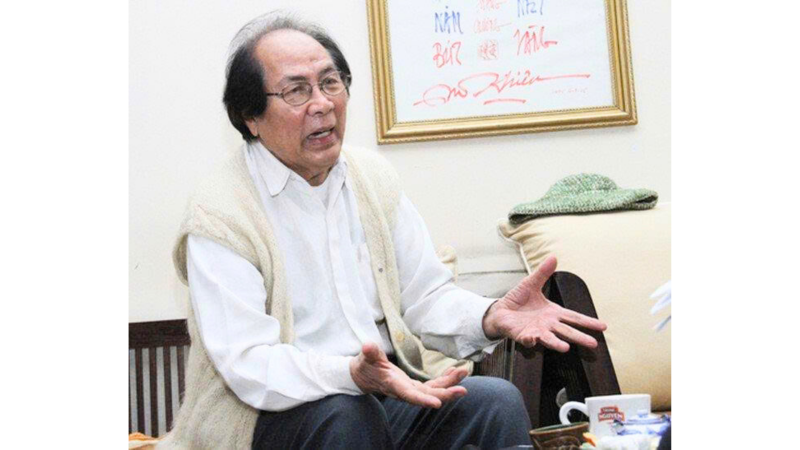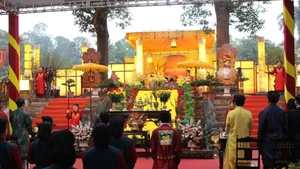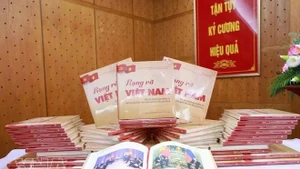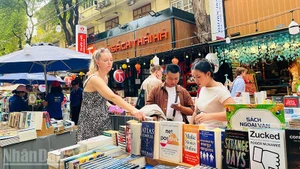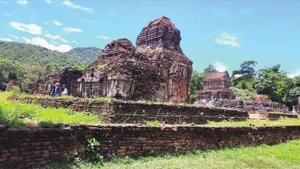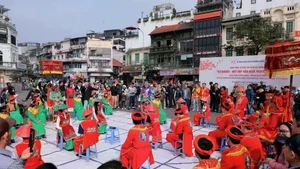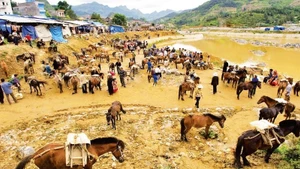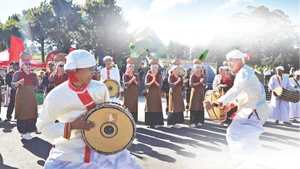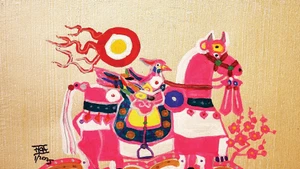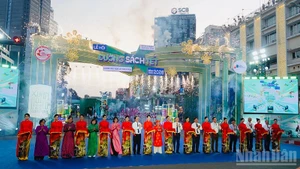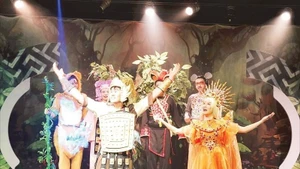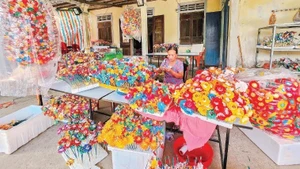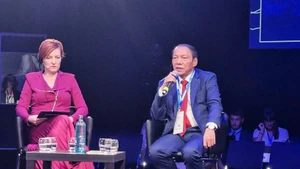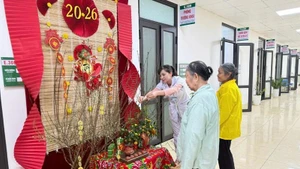Those who had the opportunity to work and accompany him on various programmes and projects remember him as a respected teacher, who always dedicated, tireless, and undeterred by difficulties.
From a young age, the boy from Binh Dinh showed a deep passion for traditional arts. At the age of 15, Hoang Chuong decided to enter the provincial music school, later joining the youth military academy and the art troupe of Interzone V. He went on to study at Academy of Arts of the Soviet Union (1962–1964), pursued studies at the Faculty of Literature under Ha Noi General University (1964–1967), and earned a PhD in Romania (1969–1973). Throughout those academic years, he persistently acquired knowledge and nurtured his aspiration to preserve and promote national culture.
One of Professor Hoang Chuong’s most notable achievements was the revival of the art of Bai Choi singing in northern Viet Nam after 35 years of absence. An artist who collaborated with him on these projects shared: “Professor Chuong not only guided us in performance techniques but also conveyed a profound love for traditional culture. He often recounted chants and melodies he had collected from folk artisans, emphasising that preserving these values is about safeguarding the nation's history and soul.”
In 2017, UNESCO recognised Bai Choi singing as an Intangible Cultural Heritage of Humanity.
Professor Hoang Chuong also made significant contributions to preserving other traditional performing arts such as tuong (classical drama), quan ho (folk singing), xam (blind busker’s music), and water puppetry. He directed more than 50 tuong plays, including notable works like “Ngon lua Hong Son (Flame of Hong Son) and “Tran Quoc Toan ra quan” (Tran Quoc Toan launches the battle), which received gold and silver medals at national professional theatre festivals.
His academic contributions were equally remarkable, through scholarly works such as “History of Vietnamese Theatre”, “Preservation and Promotion of the Values of Bai Choi singing”, and other influential studies including “Issues in Traditional Theatre”, “Bai Choi and Folk Songs of Interzone V”, “Northern Tuong Art”, “Tuong and Traditional Martial Arts”, “Water Puppetry”, 100 Years of Cai Luong”, and “Bai Choi art form”. These publications have become valuable resources for researchers and performers alike.
To bring Vietnamese folk art to the world and elevate Viet Nam’s cultural standing internationally, he actively promoted cultural exchanges and cooperation with countries such as the Republic of Korea, the US, Japan, France, and Romania. Many international seminars he organised generated strong engagement, such as: “Tuong with Foreign Themes”, “Similarities between Vietnamese and Korean Culture”, “Literature and Arts on the Tay Son Dynasty”, “Traditional Vietnamese Music and Theatre for Foreigners”, among others.
His colleagues admired his devotion, not only for his theoretical expertise but also for his attention to practical details. He could spontaneously sing “Tuong” or “Bai choi” performances vividly — that was how he inspired and persuaded others. As he once pointed out: “A researcher must stay grounded in reality — must know how Tuong, Cheo, Cai luong, Bai choi, and Ca Hue (Hue traditional singing) are surviving and evolving. To know this, one must attend performances in theatres, festivals, and conduct sociological surveys from various sources.” His dedication served as a great source of inspiration to friends and colleagues.
In 2005, Professor Hoang Chuong was awarded the First-Class Labour Order by the State. In 2010, he was named one of the ten most outstanding scientists at the National Patriotic Emulation Congress of the Viet Nam Union of Science and Technology Associations. In 2021, he was honoured with the title Labour Hero in the Doi Moi (Renewal) Period by the President of Viet Nam and was recognised as an Outstanding Citizen of Ha Noi.
His contributions went beyond preservation; he breathed new life into cultural heritage, making it resonate with modern life. One of his most notable initiatives was incorporating folk arts into extracurricular and cultural programmes in schools, helping students access and appreciate their ancestral heritage. Notable projects included “School Theatre”, and initiatives promoting traffic culture through mass media and cultural performances.
He believed that “to prevent the loss of national culture, it is crucial to sow its seeds in the hearts of the younger generation.” He poured his passion into these projects, trusting that young people would come to understand, love, and carry forward the mission of cultural preservation initiated by previous generations. To him, this was proof of how folk knowledge is passed down and connects generations.
In 2021, he was conferred the title Labour Hero in the Renewal Period. In his final years, he remained mentally sharp and full of passion. The image of the professor, leaning on a cane and passionately discussing traffic culture or national values at a seminar at the Viet Nam National Institute of Culture and Arts Studies, left a lasting impression on many.
Professor Hoang Chuong passed away on the afternoon of June 5, 2025, leaving many in deep sorrow. Young artist Mai Tuyet Hoa (from the Xam Ha Thanh troupe) was the first to share news of his passing on Facebook. She had visited him on June 4, and although he could no longer speak, he still recognised her. As someone fortunate to be mentored by Professor Chuong, Mai Tuyet Hoa expressed deep admiration for his tireless work ethic and unwavering dedication: “Young artists like us could hardly keep up — his phone was always ringing off the hook. He never gave up, no matter how difficult the task.”
As the founder of the Centre for Research, Preservation, and Promotion of Viet Nam’s National Culture, he started with virtually nothing — “empty-handed against giants.” Yet through his determination, talent, and resourcefulness, Professor Chuong led the Centre in implementing numerous meaningful community projects that honored Vietnamese cultural identity. He turned it into a trusted hub connecting artisans, scholars, managers, artists, and the public.
His life’s work is a lasting inspiration to generations of artists, especially the youth, exemplifying the model of a dedicated researcher and passionate artist always concerned with preserving cultural identity. His tireless efforts helped introduce Vietnamese culture to the world and encouraged younger generations to recognise and embrace the value of their roots, as he once said: “Culture is not only the memory of a nation, but also its luggage for integration and development. If we lose our identity, we lose ourselves.”
